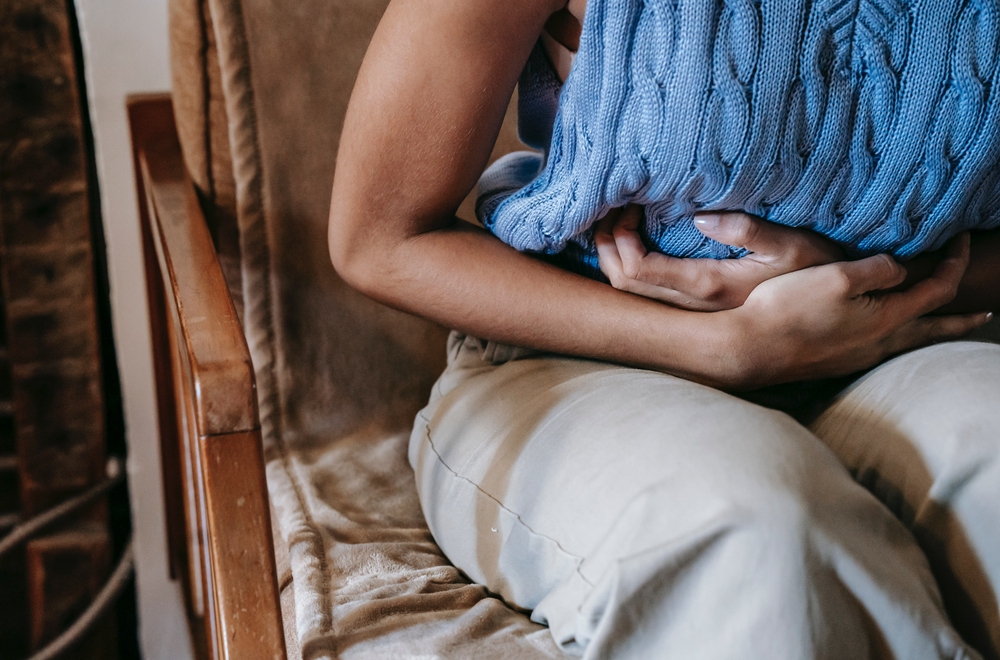
IBS In Women: How To Support your Digestive System
I'm sure you've heard of IBS, otherwise known as Irritable Bowel Syndrome, before. Hearing of it knowing exactly what it is, symptoms, causes, and treatments is another thing. One fact is that women are more susceptible to IBS than men.
So in this article, we will go over IBS in women, and how to support your digestive system to avoid it.
What Exactly Is IBS? (Irritable Bowel Syndrome)
Irritable bowel syndrome (IBS) is a common disorder that affects the stomach and intestines, also called the gastrointestinal tract. Symptoms include cramping, abdominal pain, bloating, gas, and diarrhea or constipation. IBS can be unpleasant and disruptive to your life but it is important to remember that it is a chronic condition that you'll need to manage long term. There are treatments available that can help lessen the symptoms of IBS and improve your quality of life.
IBS and Women, Are They More Prone To Getting It?
Women are more prone to get IBS than men. According to this study, the ratio is 2-2.5:1. Why is this? It is believed that the differences between women and men getting IBS has to do with the sexual hormones in the body.
However this is just one theory, and there are other factors that may be at play here. Some experts believe that IBS may have a genetic component, as it sometimes runs in families. Other potential causes can include diet choices, stress levels, or environmental factors.
There's still research being done to figure out exactly how and why IBS occurs in women (and even men), and it hasn't been fully understood yet. But there are steps you can take to reduce the risk of IBS and support your digestive system (we'll get into that later).
What Are The Symptoms Of IBS In Women?
Not only are women more susceptible to getting IBS, but their symptoms also differ from men. This is because men have to deal with IBS-D whereas women have to deal with IBS-C. Below we will go over all of the different symptoms that you can have with IBS as woman:
Abdominal Pain
Men may experience some abdominal pain, but women with IBS are more likely to have severe abdominal pain. This is pain that is long lasting, affects your daily life, and can be quite severe.
Constipation
Due to fluctuations in estrogen and progesterone, which are known to affect the gut by relaxing the muscles of your intestines, women are more likely to have constipation.
Depression And Anxiety
Not only are women more prone to more abdominal pain and constipation, but they are also more likely to experience depression and anxiety when dealing with IBS. This makes plenty of sense, because a gut that isn't functioning the right way, is known to cause mental changes.
It's likely that all the symptoms as a whole could cause you to experience more stress, anxiety, and depression as well.
Extreme Fatigue
This is one of the most common complaints about symptoms when it comes to irritable bowel syndrome. However, just like the more extreme abdominal pain women have to deal with, they also have to deal with more drastic fatigue and mood changes.
More Likely To Suffer From Migraines
According to research, women with IBS are more likely to suffer from migraines than their non-IBS counterparts. The research ruled out any other reasoning as to why these women were more likely to have migraines, but are not able to pinpoint exactly why this is happening. You could go back to the hormone point, but that hasn't been proven to be the exact reasoning yet.
How Can You Relieve IBS Symptoms?
Although IBS is chronic, there are certain things you could do in order to help relieve and manage the symptoms. Some of these include:
Taking a Probiotic Supplement
Probiotics are a potential treatment option for IBS due to their ability to help manage many of the annoying symptoms that are associated with this condition. They help by stopping the growth of disease-causing bacteria and improving immune system function. Probiotics can also help get rid of inflammation in the gut and enhance digestive health. Another thing probiotics could do is strengthen the intestinal barrier, which increases the likelihood of digesting all of your nutrients properly. Lastly, they can slow down bowel movements by stabilizing the gut flora (bacteria that lives in the gut), reducing gas and thereby reducing symptoms like bloating and cramping.
Which probiotic supplement is best for relieving IBS symptoms?
Digestive Vibrance is the perfect supplement to support IBS symptoms. It contains a powerful blend of fermentable fibers, 100 billion probiotics, and a group of ingredients all carefully selected for their proven digestive health benefits.
Digestive vibrance can help with the following:
- Improved Bowel Support
- Reduction In Bloating
- Eases Abdominal Pain
- Restores Regularity
The other ingredients Digestive Vibrance contain which helps boost your overall digestive even more are:
Acacia Gum
This basically works as a gut detoxification agent, it binds to toxins and bad bacteria and removes them from the body.
Wheat Grass
This grass is a rich source of vitamins, minerals, antioxidants and amino acids. This also has detoxification effects, as well as improves energy.
Psyllium Husk
Psyllium Husk is full of fiber which is essential for a healthy gut. It also helps with satiety (feeling of being satisfied or comfortably full) which is great for reducing bloating and cravings.
Bifidobacterium Longum
Bifidobacterium longum is a specific strain of beneficial bacteria that has been shown to reduce the number of harmful bacteria. In other words, it's good for the immune system. Another plus is that it helps keep cholesterol at healthy levels.
Keep Stress Levels Low
Stress levels are closely linked to irritable bowel syndrome, and managing stress can be a great way to help with your symptoms.
Constant stress messes with the brain and gut axis, which can cause an increase in your symptoms. One symptom shown to really be affected by stress is abdominal pain. So how can you keep your stress levels down and prevent this from happening?
Some tips for managing stress levels include:
Relaxing, and using techniques like meditation
Doing meditation will help reduce the stress hormones in your body, which will help with reducing any irritable bowel symptoms you may be experiencing.
You don't have to meditate all day. Getting in at least 10 minutes a day could help calm your mind and reduce stress significantly.
Do Light Exercise
Doing light exercise could also help when it comes to reducing your stress levels. This could include going for a walk, or doing some yoga or stretching. Exercise releases endorphins, which help improve mood and make you feel happier. However, doing extreme levels of exercise could actually over stress the body, which wouldn't be good for your IBS symptoms.
A 20 minute walk or slow jog may be good enough on a daily basis to help blow off some steam.
Getting Your Diet Right
Not only should you get the right foods in, but you should also eat on a certain schedule. Not eating often enough could leave your stomach feeling extra sensitive and irritated, so try to eat small meals throughout the day instead of just 2 or 3 big meals.
Also, when eating try and not eat too fast. Eating too fast could overwhelm your digestive system and cause your symptoms to flare up.
When it comes to foods to avoid, you don't want to have foods that are too high in sugars including:
- High sugar coffees (acidic + sugar is a big no)
- Avoid drinking alcohol too often
- Avoid gassy foods, and that includes some vegetables like broccoli
- Foods that are high in fat could also be problematic
Not every IBS case is the same. So when it comes to the diet you should be having, you need to work with your doctor or a nutritionist to come up with the best plan for you.
Some foods will be more harmful to you than someone else with IBS, so you need to figure out what works for you and what doesn't. Here's what we do know that could help you:
Foods high in fiber could help with your symptoms.
As we stated above when talking about Digestive Vibrance, fiber helps relieve constipation and abdominal pain by aiding in digestion.
Avoiding lactose may help some people, especially if they are sensitive to lactose.
One in three people with IBS are also sensitive to lactose. By removing lactose, you may be able to get a good idea if it helps your IBS symptoms.
Avoiding caffeine could also help, as it can worsen symptoms.
Gut motility is sped up by caffeine, which could lead to increased pain. If you can't do without your caffeine, at least try and limit it. However, if you have tried everything else and you are still experiencing symptoms, caffeine may be the culprit.
Staying away from gluten has shown proof to help alleviate symptoms for some people with IBS.
There's mixed studies when it comes to gluten and IBS, but some people claim it has helped them. Try eliminating gluten for 2 weeks and see if you notice a difference in your symptoms.
Low fat diets have also been known to help with IBS symptoms.
Staying away from fatty foods may help your symptoms. This is because fatty foods take a lot more time to digest, which could irritate your stomach and intestines.
Lastly, try and avoid spicy foods as they can worsen symptoms as well.
Spicy foods can irritate someone without IBS, so it's no surprise that they could cause problems for someone with IBS.
In Summary
Now we know women have a much harder time with IBS than males. We also know that IBS is chronic, and there is no known cure for it. However by managing your symptoms, and making lifestyle changes like the ones we mentioned above, IBS can be bearable. It may take a while to figure out what works best for you, but with time and patience, you can find a way to live with IBS.
Other Supplements From Vibrant Health
We mentioned Digestive Vibrance when talking about managing your IBS symptoms. Vibrant Health also has many more supplements to help with your overall health. Check out our store to see more! Also, if you'd like to get educated on everything health, check out our blog for great reads!

Why Trust Vibrant Health?
At Vibrant Health, we’ve been pioneers in science-backed nutrition for over 30 years, formulating transparently sourced superfood supplements that prioritize real results. Our blog is an extension of that commitment—a trusted resource for expert-driven wellness insights.
Every article is crafted with nutrition expertise, backed by the latest scientific research, and reviewed by our in-house Certified Health Coaches and Product Educators. We break down complex health topics into practical, actionable advice—helping you make informed choices about superfoods, supplementation, and holistic wellness.As a brand that has earned thousands of 5-star reviews and the trust of health professionals, we ensure that our content reflects the same quality, integrity, and transparency as our products.
Your wellness journey deserves accurate, credible, and empowering guidance. That’s why Vibrant Health’s blog is here—to help you live a healthier, more vibrant life, backed by real expertise


